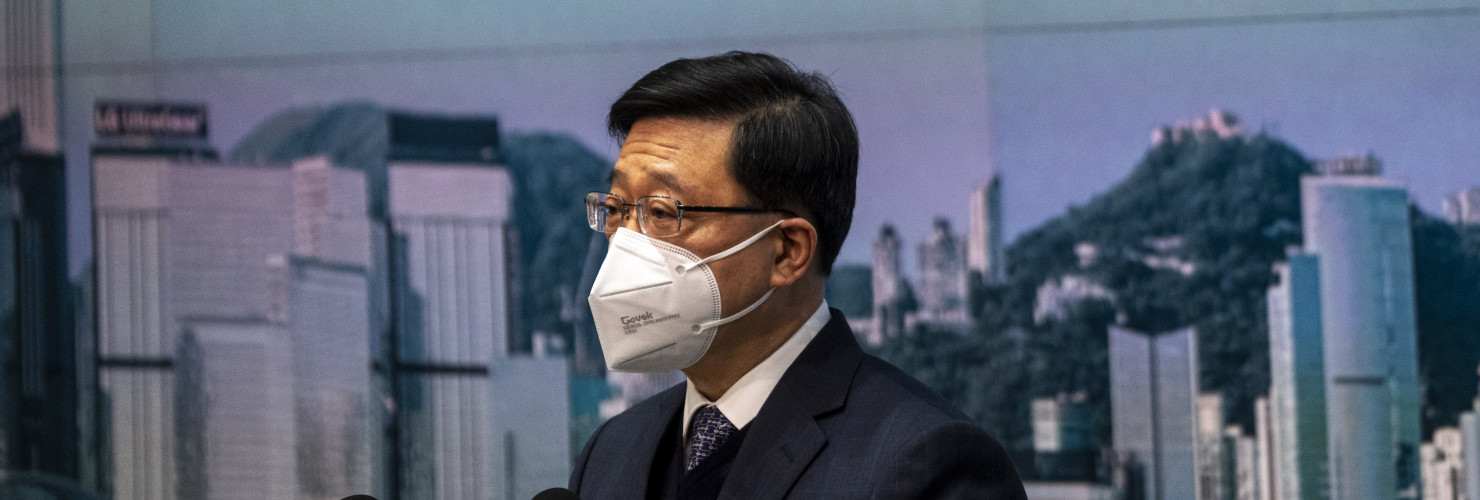

More bad news for what’s left of Hong Kong’s rule of law
A ruling in Beijing recently gave the Hong Kong executive more power over the judiciary. National security has an ever-bigger role in the way the territory is governed, says Sophie Reiß.
China has shifted more power from Hong Kong’s judiciary to the territory’s Beijing-friendly executive. In late December, the Standing Committee of China’s National People’s Congress (NPC) ruled that Hong Kong’s Committee for Safeguarding National Security, chaired by Chief Executive and Beijing loyalist John Lee, could decide whether any issue brought before a Hong Kong court falls under the controversial Hong Kong National Security Law (HKNSL) – in effect allowing Lee and his government to bypass unwelcome court decisions.
The move by China’s permanent law-making body could further restrict the rule of law in Hong Kong. It gives the territory’s government the means to close off one of the few remaining ways to challenge decisions in cases relevant to national security. It was Lee himself who asked the Standing Committee to interpret relevant parts of the HKNSL after a local court ruled the democracy-supporting businessman Jimmy Lai could be represented by a British lawyer. The former newspaper publisher is in prison already and now faces charges of collusion with foreign forces and sedition, which could lead to a life sentence.
Authorities can ban foreign lawyers from some cases
Beijing’s call most immediately gives Hong Kong’s Chief Executive the right to bar overseas lawyers from representing clients in national security cases. This won’t affect most Hong Kongers directly, but it could crucially weaken the representation of citizens in high-stakes political trials. Lai’s case stands in the context of a wider development in the territory’s legal sector. Its common law tradition and the provisions of the 1997 Basic Law mean Hong Kong has long had non-local judges serving in its courts. Although many are staying on, several have joined the exodus of legal professionals since the HKNSL came into force in 2020.
This can jeopardize legal representation, especially in cases the Hong Kong government considers politically sensitive. More broadly, the Executive Council’s new power to bypass court rulings on the grounds of national security looks set to extend application of the HKNSL. Since June 2020, it has increasingly limited civil society, for example, affecting education from kindergarten and schools to a mandatory graduation requirement in HK universities. There are teacher guidelines about the “correct understanding” of the HKNSL, and the territory’s media scene has narrowed – Lai’s Apple Daily was forced to close in 2021.
Hong Kong plans to pass its own national security law
During his unopposed candidacy to become Chief Executive in 2022, Lee pledged to implement the controversial Article 23 of Hong Kong’s Basic Law. It requires the territory to impose its own national security legislation, a move avoided by previous Chiefs Executive since huge popular protests derailed a first attempt in 2003. Hong Kong’s own national security law is expected to take over the HKNSL’s strictures against secession, subversion, terrorism and collusion with foreign forces – and add a focus on espionage, an area officials in Beijing and Hong Kong apparently consider to be inadequately covered by existing rules.
Officials in Hong Kong and on the mainland argue that the HKNSL and Article 23 legislation will contribute to peace and stability in Hong Kong, restoring social order while safeguarding the principle of “one country, two systems.” On the surface, the situation in Hong Kong does indeed seem to have calmed down. But the impression of a stable state of “new normal” obscures the ongoing erosion of Hong Kong’s rule of law and civil liberties – suppression of political opposition has largely been taken from the streets to the courts with the HKSNL.
The ongoing erosion of civil rights affects Hong Kong’s development
The governments in Hong Kong and Beijing are now in the process of further solidifying their gains. The NPC Standing Committee’s ruling on the HKNSL and Lee’s plans to implement Article 23 will reduce legal protections for those with unwelcome views. They will make the continuing crackdown on the opposition less visible and so less present in the global media. But this should not be interpreted as authorities taking a lighter approach – suppression is taking place in the judicial domain in the form of often lengthy and complex trials.
Given the HKNSL’s vague and wide reach – authorities in Hong Kong have the power to apply it extraterritorially and retroactively – official use of the term “national security” has increased general insecurity about what can and can’t be done. This is affecting more than Hong Kong’s freedoms and civil society. It is not just about high-stakes trials like Jimmy Lai’s – along with emigration and a resulting brain drain, the ongoing erosion of civil rights and politization of the judiciary is affecting Hong Kong’s development and society.

